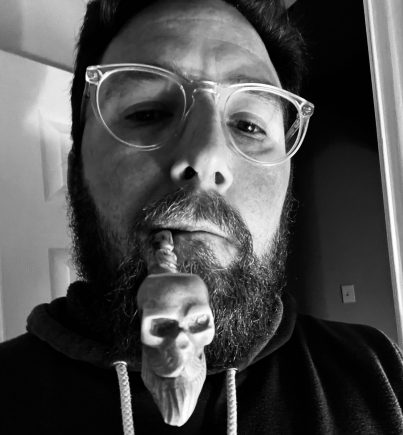“I like beautiful melodies telling me terrible things.”
— Tom Waits

It’s a question that I get asked, and I’ve answered to varying degrees in conversations with friends, coworkers, and family: Why write horror? Sometimes it comes when we’re talking about hobbies, but it’s often asked with most urgency after reading a short story about child-stealing demons or murdering magicians, as they are deciding whether I’m as well-adjusted as they’d assumed.
The simple answer, which is still true, is that I grew up on it. Some of my deepest memories were formed while I was curled up on the couch with my dad, watching 80s slashers or cheesy monster movies. He would use those moments to teach me about good and evil, bravery in the face of danger, and the importance of not splitting up to explore dark rooms alone.
The deeper reason is that horror (and children’s stories) are a way to talk about very real and serious issues, without actually talking about them. My stories are about faith, fatherhood, generational trauma, the responsibility of creators, and sometimes things individual readers pick up; but they’re also about monsters and things that go bump in the night. It’s not just a veneer to make talking about the deeper things palatable, though. There is something in humans, and how we’re wired to accept stories, that allows them to transcend past the logical parts of our brain and engage truths on a deeper level.
“Stories are part of us, and we convey truth with stories, which is fundamentally the most gloriously giant contradiction that you can ever imagine. What we’re saying is, we are using lies, we’re using memorable lies, we are taking people who do not exist and things that did not happen to those people in places that aren’t, and we are using those things to communicate true things to kids and to each other.”
— Neil Gaiman
Okay, so that kind of explains my shift to fiction, but does it really explain horror and children’s stories? First, I think that a more fantastical story, whether horror, fantasy, or sometimes science fiction, makes it even easier to talk about truths. You’re stepping into a world that is markedly different from your own, even if the only difference is the ability to reanimate bodies with science and electricity; in this new world, the dangers of pride or reckless experimentation are no longer theoretical, and you’ve decided to accept that there are formerly unimaginable consequences for these actions. Through specificity and relatability in this false world, the stories become universal in our world.
Along with that, but I believe that horror taps into the part of our brain that is willing to accept light and dark, good and evil, and things bigger than ourselves. You’ve decided to take the author at his word that anything can happen in this world he created, and you’re letting down your skepticism for just a little bit. As a skeptic and over-analyzer of many things, I know I can learn a lot when I’m forced to just let that go. William Peter Blatty knew that when he was writing The Exorcist.
“I was trying to get across that this is not a horror story. This is real. It is a great mystery that providence should permit diabolical activity, but we know that God works for good with those who love him.”
— William Peter Blatty
The wonderful thing is that children’s stories do the same thing (possibly because horror and fables have always been close relatives, but that’s another article). Of course, I mainly write children’s stories because of my son. He asks, and I agree. I tell him stories about pet dragons, transforming elves, and monsters that seem scary until you know what’s really going on. Afterwards, when he wants to talk about making new friends or the importance of bravery, I just act like that wasn’t what I was writing about all along.